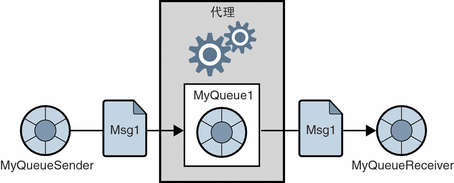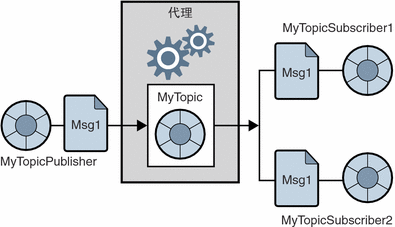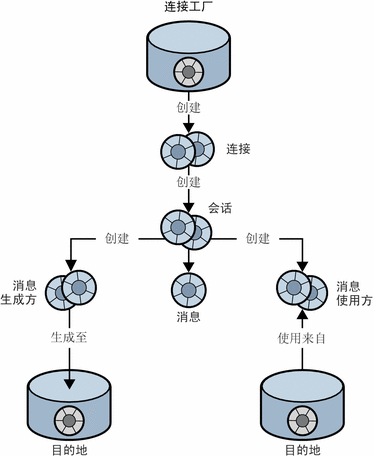AMQ学习笔记 - 02. JMS客户端编程模型
概述
消息传送模式
PTP

- 一个Message只能交给一个Receiver;这里的Message像是一个消耗品。
- 只要Queue中有Message,Receiver就能获取到。
Pub/Sub

- 一个Message可以复制多份,交给多个Subscriber。
- 先订阅,再获取 - Subscriber只能获取订阅之后发送到Topic的Message。
角色定位

JMS API
统一域和特定于域的API

编程模型

对象简介
- 连接工厂(ConnectionFactory)
客户端使用连接工厂对象(ConnectionFactory)创建连接。 - 连接(Connection)
连接对象 (Connection) 表示客户端与代理之间的活动连接。创建连接时会分配通信资源并对客户端进行验证。这是一个相当重要的对象,大多数客户端均使用一个连接来完成所有的消息传送。连接支持并发使用:一个连接可由任意数量的生成方和使用方共享。 - 会话(Session)
如果连接代表客户端与代理之间的通信渠道,则会话标记客户端与代理之间的单次对话。会话对象主要用于创建消息、消息生成方和消息使用方。 - 消息(Message)
消息封装一次通信的内容。消息由三部分组成:消息头、属性和主体。 - 消息生成方(MessageProducer)
由Session创建,负责发送Message到目的地。 - 消息使用方(MessageConsumer)
由Session创建,负责从目的地中消费Message。 - 目的地(Destination)
JMS Provider负责维护,用于对Message进行管理的对象。MessageProducer需要指定Destination才能发送消息,MessageReceiver需要指定Destination才能接收消息。
demo
Error occurred during initialization of VM
Could not reserve enough space for object heap
Error: Could not create the Java Virtual Machine.
Error: A fatal exception has occurred. Program will exit.
if "%ACTIVEMQ_OPTS%" == "" set ACTIVEMQ_OPTS=-Xms1G -Xmx1G
1.producer-client
文件目录结构
pom.xml
src/main/resources/
|---- jndi.properties
src/main/java/
|---- cn.sinobest.asj.producer.jms.clientmode
|---- SimpleProducer.java # 基于客户端编程模型,发送消息给ActiveMQ
文件内容
1.pom.xml
<project xmlns="http://maven.apache.org/POM/4.0.0"
xmlns:xsi="http://www.w3.org/2001/XMLSchema-instance"
xsi:schemaLocation="http://maven.apache.org/POM/4.0.0 http://maven.apache.org/xsd/maven-4.0.0.xsd">
<modelVersion>4.0.0</modelVersion>
<groupId>cn.sinobest.asj</groupId>
<artifactId>jms-producer</artifactId>
<version>0.0.1-SNAPSHOT</version>
<name>jms-producer</name>
<description>基于ActiveMQ的Producer Client。</description>
<dependencies>
<!-- import activemq-client to send message to ActiveMQ -->
<dependency>
<groupId>org.apache.activemq</groupId>
<artifactId>activemq-client</artifactId>
<version>5.13.2</version>
</dependency>
<!-- not necessary, import to remove the warn message from activemq-client -->
<dependency>
<groupId>org.slf4j</groupId>
<artifactId>slf4j-simple</artifactId>
<version>1.7.19</version>
</dependency>
</dependencies>
</project>
2.jndi.properties
java.naming.factory.initial=org.apache.activemq.jndi.ActiveMQInitialContextFactory # use the following property to configure the default connector
java.naming.provider.url=tcp://localhost:61616 # register some queues in JNDI using the form
# queue.[jndiName] = [physicalName]
queue.exampleQueue=example.queue # register some topics in JNDI using the form
# topic.[jndiName] = [physicalName]
topic.exampleTopic = example.topic
说明:
- java.naming.factory.initial
定义ConnectionFactory的实例化类。 - java.naming.provider.url
定义broker的url,这个是ActiveMQ默认的url。 - queue.exampleQueue
定义了一个Queue Destination。name为example.queue,JNDI的name为exampleQueue。 - topic.exampleTopic
定义了一个Topic Destination。name为example.topic,JNDI的name为exampleTopic。
3.SimpleProcedure.java
package cn.sinobest.asj.producer.jms.clientmode;
import javax.jms.Connection;
import javax.jms.ConnectionFactory;
import javax.jms.Destination;
import javax.jms.JMSException;
import javax.jms.MessageProducer;
import javax.jms.Session;
import javax.jms.TextMessage;
import javax.naming.Context;
import javax.naming.InitialContext;
import javax.naming.NamingException;
/**
* A simple demo for producer client to send message to ActiveMQ.<br>
* refer to <a href="http://activemq.apache.org/jndi-support.html">JNDI
* Support</a>
*
* @author lijinlong
*/
public class SimpleProducer {
/** JNDI name for ConnectionFactory */
static final String CONNECTION_FACTORY_JNDI_NAME = "ConnectionFactory";
/** JNDI name for Queue Destination (use for PTP Mode) */
static final String QUEUE_JNDI_NAME = "exampleQueue";
/** JNDI name for Topic Destination (use for Pub/Sub Mode) */
static final String TOPIC_JNDI_NAME = "exampleTopic";
/**
* @param args
*/
public static void main(String[] args) {
Context jndiContext = null;
ConnectionFactory connectionFactory = null;
Connection connection = null;
Session session = null;
Destination destination = null;
MessageProducer producer = null;
// create a JNDI API IntialContext object
try {
jndiContext = new InitialContext();
} catch (NamingException e) {
System.out.println("Could not create JNDI Context:"
+ e.getMessage());
System.exit(1);
} // look up ConnectionFactory and Destination
try {
connectionFactory = (ConnectionFactory) jndiContext
.lookup(CONNECTION_FACTORY_JNDI_NAME);
// look up QUEUE_JNDI_NAME for PTP Mode
// look up TOPIC_JNDI_NAME for Pub/Sub Mode
destination = (Destination) jndiContext.lookup(QUEUE_JNDI_NAME);
} catch (NamingException e) {
System.out.println("JNDI look up failed:" + e.getMessage());
System.exit(1);
} // send Messages and finally release the resources.
try {
connection = connectionFactory.createConnection();
session = connection.createSession(Boolean.FALSE,
Session.AUTO_ACKNOWLEDGE);
producer = session.createProducer(destination);
TextMessage message = session.createTextMessage();
for (int i = 0; i < 3; i++) {
message.setText(String.format("This is the %dth message.",
i + 1));
producer.send(message);
}
} catch (JMSException e) {
e.printStackTrace();
} finally {
try {
if (session != null)
session.close();
if (connection != null)
connection.close();
} catch (JMSException e) {
e.printStackTrace();
}
}
}
}
SimpleProcedure.java
- 第23行声明的JNDI name for ConnectionFactory的值是固定的。
- 第25行声明的JNDI name for Queue的值,对应于jndi.properties的queue的jndi name。
- 第27行声明的JNDI name for Topic的值,对应于jndi.properties的topic的jndi name。
- 第55行look up Destination的实例,参数取QUEUE_JNDI_NAME或TOPIC_JNDI_NAME,分别对应PTP模式和Pub/Sub模式。
2.consumer-client
文件目录结构
pom.xml
src/main/resources/
|---- jndi.properties
src/main/java/
|---- cn.sinobest.asj.consumer.jms.clientmode
|---- SimpleConsumer.java # 基于客户端编程模型,从ActiveMQ接收消息
文件内容
1.pom.xml
<project xmlns="http://maven.apache.org/POM/4.0.0"
xmlns:xsi="http://www.w3.org/2001/XMLSchema-instance"
xsi:schemaLocation="http://maven.apache.org/POM/4.0.0 http://maven.apache.org/xsd/maven-4.0.0.xsd">
<modelVersion>4.0.0</modelVersion>
<groupId>cn.sinoebst.asj</groupId>
<artifactId>jms-consumer</artifactId>
<version>0.0.1-SNAPSHOT</version>
<name>jms-consumer</name>
<description>基于ActiveMQ的Consumer Client。</description>
<dependencies>
<!-- import activemq-client to receive message from ActiveMQ -->
<dependency>
<groupId>org.apache.activemq</groupId>
<artifactId>activemq-client</artifactId>
<version>5.13.2</version>
</dependency>
<!-- not necessary, import to remove the warn message from activemq-client -->
<dependency>
<groupId>org.slf4j</groupId>
<artifactId>slf4j-simple</artifactId>
<version>1.7.19</version>
</dependency>
</dependencies>
</project>
2.jndi.properties
java.naming.factory.initial=org.apache.activemq.jndi.ActiveMQInitialContextFactory # use the following property to configure the default connector
java.naming.provider.url=tcp://localhost:61616 # register some queues in JNDI using the form
# queue.[jndiName] = [physicalName]
queue.exampleQueue=example.queue # register some topics in JNDI using the form
# topic.[jndiName] = [physicalName]
topic.exampleTopic = example.topic
3.SimpleConsumer.java
package cn.sinobest.asj.consumer.jms.clientmode;
import javax.jms.Connection;
import javax.jms.ConnectionFactory;
import javax.jms.Destination;
import javax.jms.JMSException;
import javax.jms.Message;
import javax.jms.MessageConsumer;
import javax.jms.Session;
import javax.jms.TextMessage;
import javax.naming.Context;
import javax.naming.InitialContext;
import javax.naming.NamingException;
/**
* A simple demo for consumer to receive message from ActiveMQ.<br>
*
* @author lijinlong
*
*/
public class SimpleConsumer {
/** JNDI name for ConnectionFactory */
static final String CONNECTION_FACTORY_JNDI_NAME = "ConnectionFactory";
/** JNDI name for Queue Destination (use for PTP Mode) */
static final String QUEUE_JNDI_NAME = "exampleQueue";
/** JNDI name for Topic Destination (use for Pub/Sub Mode) */
static final String TOPIC_JNDI_NAME = "exampleTopic";
/**
* @param args
*/
public static void main(String[] args) {
Context jndiContext = null;
ConnectionFactory connectionFactory = null;
Connection connection = null;
Session session = null;
Destination destination = null;
MessageConsumer consumer = null;
// create a JNDI API IntialContext object
try {
jndiContext = new InitialContext();
} catch (NamingException e) {
System.out.println("Could not create JNDI Context:"
+ e.getMessage());
System.exit(1);
}
// look up ConnectionFactory and Destination
try {
connectionFactory = (ConnectionFactory) jndiContext
.lookup(CONNECTION_FACTORY_JNDI_NAME);
// look up QUEUE_JNDI_NAME for PTP Mode
// look up TOPIC_JNDI_NAME for Pub/Sub Mode
destination = (Destination) jndiContext.lookup(QUEUE_JNDI_NAME);
} catch (NamingException e) {
System.out.println("JNDI look up failed:" + e.getMessage());
System.exit(1);
}
// receive Messages and finally release the resources.
try {
connection = connectionFactory.createConnection();
connection.start(); // connection should be called in
// receiver-client
session = connection.createSession(Boolean.FALSE,
Session.AUTO_ACKNOWLEDGE);
consumer = session.createConsumer(destination);
long timeout = 10 * 1000;
for (Message message = consumer.receive(timeout); message != null; message = consumer
.receive(timeout)) {
String text = ((TextMessage) message).getText();
System.out.println(String.format("receive a message:%s", text));
}
} catch (JMSException e) {
e.printStackTrace();
} finally {
try {
if (session != null)
session.close();
if (connection != null)
connection.close();
} catch (JMSException e) {
e.printStackTrace();
}
}
}
}
SimpleConsumer.java
3.测试
3.1.基于PTP Mode测试
- 确保SimpleProducer和SimpleConsumer中,都是根据QUEUE_JNDI_NAME来look up Destination实例的。
- 确保ActiveMQ启动正常。
- 运行SimpleProducer。
- 运行SimpleConsumer - 看到信息输出。

3.2.基于Pub/Sub测试
- 确保SimpleProducer和SimpleConsumer中,都是根据TOPIC_JNDI_NAME来look up Destination实例的。
- 确保ActiveMQ启动正常。
- 运行SimpleConsumer。
Pub/Sub的其中一个特点是:先订阅,再接收。所以要先运行Consumer。 - 尽快运行SimpleProducer。
Consumer设置的timeout是10s,如果10s内没有收到消息就会退出。 - SimpleConsumer的控制台有输出信息。
输出内容和PTP的测试结果一致。
4.编程获取ConnectionnFactory和Destination
// 创建工厂实例
// javax.jms.ConnectionFactory
// org.apache.activemq.ActiveMQConnectionFactory
ConnectionFactory connectionFactory = new ActiveMQConnectionFactory(
ActiveMQConnectionFactory.DEFAULT_USER,
ActiveMQConnectionFactory.DEFAULT_PASSWORD,
ActiveMQConnectionFactory.DEFAULT_BROKER_URL); // javax.jms.Connection
Connection connection = connectionFactory.createConnection();
// javax.jms.Session
Session session = connection.createSession(Boolean.FALSE, Session.AUTO_ACKNOWLEDGE); // 创建目的地
// javax.jms.Destination
Destination destination = session.createQueue("example.queue");
Destination destination = session.createTopic("example.topic");
附录
参考
- Sun Java System Message Queue 3.7 UR1 技术概述 — 第 2 章 客户端编程模型
大部分理论知识都参考了这里 - JNDI Support
如何配置、使用JNDI获取连接工厂实例和目的地实例
AMQ学习笔记 - 02. JMS客户端编程模型的更多相关文章
- 《Master Bitcoin》学习笔记02——比特币的交易模型
比特币的交易模型 模型基本描述 前面一篇学习笔记01提到了一个交易模型(第三章的内容),在第五章中,除了对这个模型做个详细介绍之外,其实和我上一篇理解的交易模型差不多,一个交易包含输入与输出,比特币是 ...
- AMQ学习笔记 - 08. Spring-JmsTemplate之发送
概述 JmsTemplate提供了3组*3,共计9个发送用的方法. 发送的方法有3组: 基本的发送 转换并发送 转换.后处理再发送 必需的资源 必需的资源有: javax.jms.Connecti ...
- AMQ学习笔记 - 05. 客户端模板化
概述 客户端编程模型中,大部分的步骤都是相同的.将相同的部分做成模板,将不同的部分预留接口,实现者就只需要针对不同的部分提供实现. 设计 类图 发送方客户端 说明: 基于模板的思想,SendTempl ...
- AMQ学习笔记 - 06. 可靠消息传送
概述 本文介绍JMS中可能发生消息故障的3个隐患阶段,以及确保消息安全的3种保障机制. 故障分析 在介绍可靠传送的确保机制之前,先分析消息在传送的过程中可能在哪个阶段出现问题. 1.两个跃点 跃点的含 ...
- 转 网络编程学习笔记一:Socket编程
题外话 前几天和朋友聊天,朋友问我怎么最近不写博客了,一个是因为最近在忙着公司使用的一些控件的开发,浏览器兼容性搞死人:但主要是因为这段时间一直在看html5的东西,看到web socket时觉得很有 ...
- 软件测试之loadrunner学习笔记-02集合点
loadrunner学习笔记-02集合点 集合点函数可以帮助我们生成有效可控的并发操作.虽然在Controller中多用户负载的Vuser是一起开始运行脚本的,但是由于计算机的串行处理机制,脚本的运行 ...
- GIS案例学习笔记-多边形内部缓冲区地理模型
GIS案例学习笔记-多边形内部缓冲区地理模型 联系方式:谢老师,135-4855-4328,xiexiaokui#qq.com 目的:对于多边形,建立内部缓冲区. 问题:ArcGIS缓冲工具不支持内部 ...
- 机器学习实战(Machine Learning in Action)学习笔记————02.k-邻近算法(KNN)
机器学习实战(Machine Learning in Action)学习笔记————02.k-邻近算法(KNN) 关键字:邻近算法(kNN: k Nearest Neighbors).python.源 ...
- OpenCV 学习笔记 02 使用opencv处理图像
1 不同色彩空间的转换 opencv 中有数百种关于不同色彩空间的转换方法,但常用的有三种色彩空间:灰度.BRG.HSV(Hue-Saturation-Value) 灰度 - 灰度色彩空间是通过去除彩 ...
随机推荐
- 2017 Multi-University Training Contest - Team 2 Puzzle
题目大意: 给定n, m, p.然后按照一个规则往n*m的方格里填数,最后一个方格是空格,然后玩拼图游戏,问能否复原 规则是:把1~n*m-1的排列中的第1,p+1,2*p+1.....个数依次取出来 ...
- bcc
#include<bits/stdc++.h> using namespace std; #define mxn 510 struct E{ int from,to; }; int dfn ...
- BZOJ3223: Tyvj 1729 文艺平衡树 无旋Treap
一开始光知道pushdown却忘了pushup......... #include<cstdio> #include<iostream> #include<cstring ...
- Android-使用ViewFlipper实现轮番切换广告栏
所谓的轮番切换广告栏,指的是下面这个东西,笔主不知道该怎么确切描述这货... 笔主没有百度研究过其他大牛是怎么实现这个功能的,在这里笔主充分发挥DIY精神,利用ViewFlipper闭门土制了一个,下 ...
- taotao用户注册前台页面
注册页面效果: 注册jsp: <%@ page language="java" contentType="text/html; charset=UTF-8" ...
- 旋转数组 [ LeetCode ]
原题地址:https://leetcode-cn.com/problems/rotate-array/description/ 给定一个数组,将数组中的元素向右移动 k 个位置,其中 k 是非负数. ...
- vue2.0基础知识,及webpack中vue的使用
## 基础指令 ## [v-cloak]{ Display:none; } <p v-cloak>xx{{msg}}xx</p> //解决闪烁问 ...
- phpcms v9 后台添加修改页面空白页问题解决方法
phpcms v9 添加修改页面空白页的解决方法 找一个正常运行的phpcms 将caches\caches_model\caches_data 目录下的 content_form.class.php ...
- Django-urls路由分发
例如:127.0.0.0:8000/blog/lucaq.html,当有多个应用时,需要在blog应用下进行路由,我们在blog应用下做一个urls路由分发,就需要include模块实现. 导 ...
- python 微博评论获取的时候日期格式化
# -*- coding: utf-8 -*- # @Time : 2018/03/05 10:57 # @Author : cxa # @File : testDataTime.py # @Soft ...
